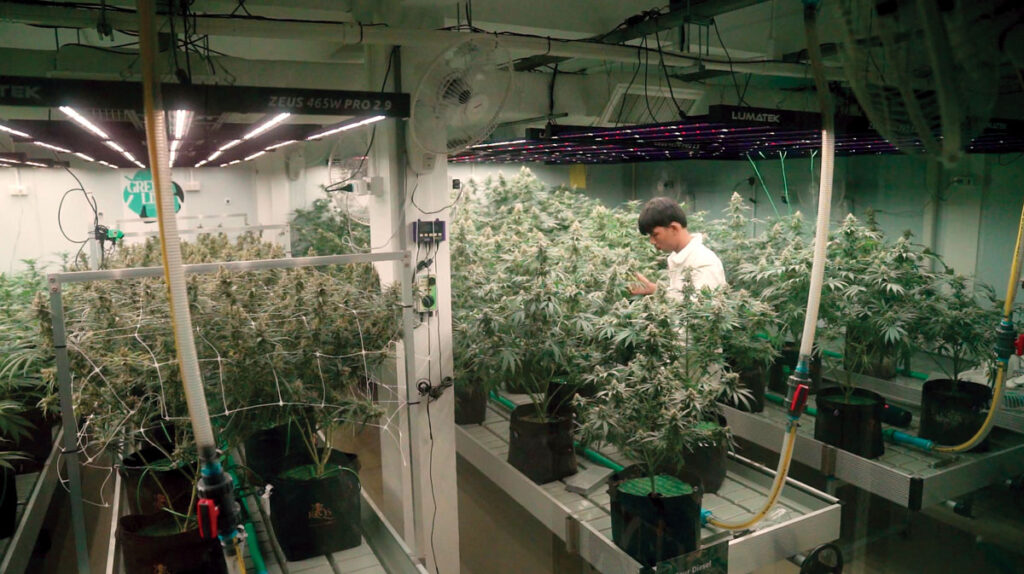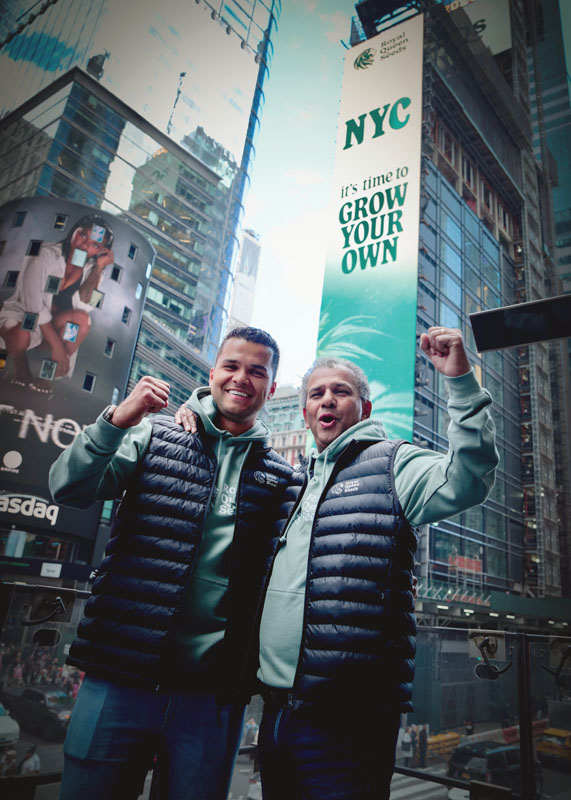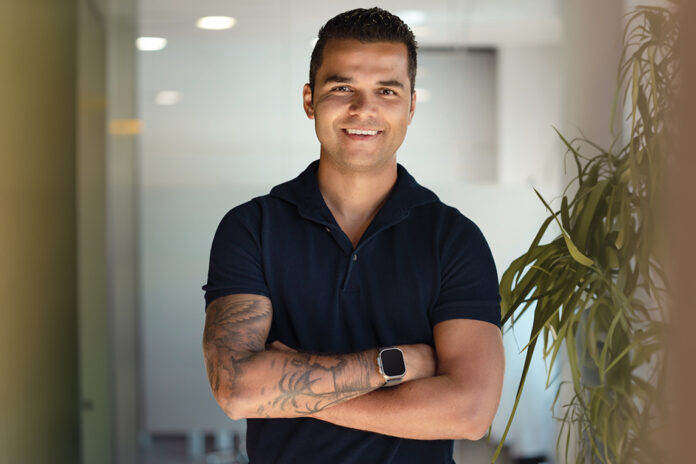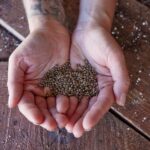Shai Ramsahai grew up immersed in the cannabis industry under the guidance of his father, Boy Ramsahai, who founded Royal Queen Seeds (RQS) in 2009. From an early age, the younger Ramsahai marinated in the dynamic world of the plant at industry conferences across Europe and while sitting at his father’s side during corporate meetings. The experiences laid the foundation for his ascension to the company president’s desk.
Ramsahai’s entrepreneurial streak arose early, largely out of a desire to follow in his father’s footsteps while simultaneously blazing his own trail. While attending trade shows and events with his dad, he often sneaked away and sold the ashtrays his father handed out as promotional items in the company’s booth. One particularly memorable day, at the age of nine, he made €800 from ashtray sales. Father and son celebrated the accomplishment with a trip to McDonald’s … before banking the rest of the windfall to fund future entrepreneurial endeavors.
Over the ensuing years, Ramsahai took on a variety of less stealthy roles within RQS, gaining hands-on experience in nearly every facet of the business. From his initial position packaging seeds in the warehouse to working as a sales representative and managing the European sales team, his professional progression provided him with an intimate understanding of the company’s inner workings.
As an adult, and with his father’s active encouragement, Ramsahai left RQS to pursue the entrepreneurial ambitions he displayed as a child. Between 2017 and 2022, he founded and led several cannabis, CBD, and hemp ventures, achieving success by expanding the companies into global markets. His experience working at every level of RQS’s operation informed his actions and propelled him over corporate hurdles until he eventually sold Amsterdam-based seeds, psychedelics, and CBD distributor SR Wholesale B.V. and European wellness brand CBD Sport. Thereafter, he found his way back to the family business, although he credits the entrepreneurial years with providing him a strong foundation for forging strategic partnerships across industries and international markets.
Ramsahai’s ability to scale businesses and navigate the complexities of international sales earned his father’s trust, and the elder Ramsahai eventually handed over the reins of the business. Today, at just thirty-one years old, Shai Ramsahai oversees Barcelona-based RQS’s continuing expansion—including the development of an impressive five-story facility in Bangkok that features a traditional storefront on the first floor, a luxurious smoking lounge and restaurant on the second, and a robust in-house cultivation operation on the third and fourth floors. Under his leadership, RQS has strengthened its position as a leading global brand with two brick-and-mortar locations in Amsterdam, one in Barcelona, the Bangkok facility, and the first-ever European-owned seed bank in the United States, which opened in Eugene, Oregon, in 2023. RQS also brought to market the first F1 hybrid seeds for home-growers, launching the F1 Elite line in 2023. What’s more, earlier this year RQS partnered with Tyson 2.0 to offer consumers seeds from Mike Tyson’s handpicked favorite strains. The brand already accounts for just under 5 percent of RQS’s total revenue, and Ramsahai believes sales will increase substantially as the company widens its range of Tyson 2.0 products beyond seeds.
A blend of entrepreneurial drive and family connection is central to Ramsahai’s approach to leadership, especially as he navigates the company through choppy waters in Thailand’s cannabis industry. Earlier this year, the Southeast Asian nation flirted with a return to prohibition before settling on tightened regulations for a medical-only legal market.

Of all the different roles you’ve held at RQS—from the warehouse floor to the executive suite—which job did you enjoy most?
I’ve found all positions within Royal Queen Seeds fun and challenging. I really enjoyed my time in the warehouse, being singularly focused on processing orders with the team. But I love my job at the moment—meeting nice people, developing and executing with our great team, taking the company to the next level.
The industry’s dynamics have changed over the past five years. What changes are you seeing in your segment of the market?
We’ve seen cannabis home-grow interest explode, especially in new midwest states like Ohio—which is one of our largest markets by sales—and Minnesota. New York has seen similar growth since its home-grow regulations took effect. Internationally, Germany has been a massive and exciting market for us.
In the past five years, we’ve seen social conversations move from “Can I grow at home?” to “How do I grow the best cannabis at home?” This shift has been both exciting and challenging, as we are committed to distilling decades of experience into educational content that both newbie and expert growers can understand, ensuring they feel supported and informed.
Another consumer trend is increased demand for old-school strains such as Northern Lights, White Widow, and Sour D. Keeping up with consumer demand for new cannabis flowers can be tricky, because the development of cannabis has a time minimum. While high THC values are one of the most important factors for U.S. cannabis seed buyers, the increasing demand for nostalgic strains may mean U.S. consumers are starting to care more about the feeling each unique strain gives them. They may also want the social aspect of cannabis consumption, and for the vast majority of consumers, old-school trains with THC percentages near or under 20 percent are the perfect go-to.
For U.S. commercial cannabis cultivators, often those strains require longer flowering times. They are worth growing, but [classic strains] may need their own growing spaces.
What is your growth strategy?
First, we are securing our position in our current markets by heavily investing in marketing and branding in critical global regions like the U.S. and Germany, ensuring we maintain our leadership position. Additionally, we are closely monitoring legislative developments in emerging markets that show promise, including South Africa and Brazil. We are also diversifying our product offerings while exploring opportunities to expand into unexplored verticals like flower and other “final” products [like edibles and vapes].
Existing competition is always something to consider, as is the need for more knowledge about the political and legislative context. One of our most natural moves is to expand the brand in areas it is already loved.
Take our launch in the U.S. as an example: We had been leading the [search engine results] for cannabis and helping growers from all across the States cultivate their own [plants] even before we opened our first U.S.-based warehouse facility. That’s why, when people were finally able to get their RQS seeds locally, they did. It was a natural progression. We expect similar outcomes in other markets such as Colombia, Germany, Thailand, and additional U.S. locations.
RQS remains open to new and exciting partnerships with U.S. companies. American cannabis companies face challenges because [Internal Revenue Code Section] 280E taxes tie up so much of their capital. With rescheduling, we hope to see an explosion of unique, beneficial partnerships across the states.
[In December, the U.S. Drug Enforcement Administration will hold a public hearing about a proposal to move cannabis from Schedule I to Schedule III under the federal Controlled Substances Act. Rescheduling would free the regulated industry from some federal tax obligations and potentially provide other benefits, but reclassification is unlikely to occur before 2025. —Ed.]
Over the past several years, companies in our industry have had a hard time raising capital from both public markets and private sources. How has RQS managed to expand during times when capital is scarce?
Royal Queen Seeds is lucky to be a private, family-run business still. While we continue to pour money into [research and development] to develop new strains and ensure our seeds are healthy and vigorous, we don’t have the same real estate overhead that other licensed American cannabis companies have. Additionally, in the U.S. we haven’t had to spend any capital on license applications and all the hidden fees that come with that process. [Because seeds generally contain less than the federal limit of 0.3-percent THC, the U.S. Drug Enforcement Administration has acknowledged seeds are uncontrolled and federally legal, regardless of how much THC plants cultivated from the seeds develop. —Ed.]
The investors we have taken on are like family to us. Royal Queen Seeds has been profitable for years; we don’t foresee that changing.
What are your strategic priorities moving forward?
The RQS team’s efforts are centralized in our Barcelona headquarters and additional offices in key places like Eugene [Oregon] and the Netherlands, but we’re always exploring new markets and whether it would be valuable to open flagship stores. We aim to establish strong leadership in our top markets and explore new channels to reach the global community through high-impact activations. Investing in [research and development] will always be a priority to remain at the forefront of innovation for hobbyists and professional cultivators alike.
In the U.S., we continue to see more states legalizing both recreational and medical cannabis, as well as home-growing. RQS was the first European company to open a warehouse in Oregon a year and a half ago, and that made us the first European cannabis seed company to have a physical facility in the U.S. The midwest has been huge; Ohio is our largest market by sales. We have our eyes on any state looking to legalize, especially with fair and safe home-grow regulations.
Germany’s [adult-use] legalization on the first of April this year has had a tremendously positive impact on the industry and marks the beginning of a new era in the European cannabis landscape. Making indoor home-growing legal also benefits seed banks, so of course we keep an eye on those markets.
How has RQS’s Thailand operation evolved in the wake of the regulatory upheaval the country underwent recently?
The environment in Thailand is somewhat volatile, but we are adapting to the regulations. The nice thing about Thailand is they can make cannabis legal in one day, but the negative thing is that they can make it illegal in one day, [which has] made it hard to see a future for RQS in the country at times.
At the end of July 2022, we opened the first cannabis experience in Thailand, where people can enter a store and walk through the building. We have a five-floor building; it was a huge project. Market opportunity and regulations at the time allowed us to share a true from-seed-to-harvest experience, which had been our lifelong dream: to create the perfect space to educate consumers about the plant and its cultivation while providing the perfect atmosphere to enjoy its benefits in good company.
We will soon incorporate a medical center into the same building, which will comply with potential new government regulations.
You’ve worked with both the hemp and cannabis industries. What do you think of the current tension between the two?
Both industries share common interests in legalization, regulation, and market growth while focusing on different products and applications. However, the distinctions in tax models are currently creating some friction between them. I believe this relationship should evolve into a more cooperative partnership, with increased cross-industry innovation, co-advocacy for policy changes, and shared supply chain resources as both markets expand and mature.
RQS already offers a line of CBG-, CBN-, and THCV-dominant seeds, but do you envision the company might one day expand its catalog to include hemp-derived, non-THC products?
Even though these products have strong potential as consumer interest grows, success will depend on achieving clear regulations and social education. We are always open to expanding our product range to better adapt to our community’s needs, so we will not close that door in the future.
As an international operator, what do you consider the most undervalued international market?
Colombia’s strong legal framework, low production costs, favorable climate, and strategic location make it an undervalued market.
What about the most overvalued?
Canada is absolutely overvalued. There are intense barriers for outsiders wanting to break into the market, and the Canadian operators are well-established businesses and brands.











